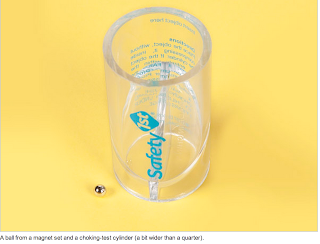The Consumer Product Safety Commission’s controversial campaign to ban magnet spheres keeps losing ground as Public Policy Polling recently released results showing an overwhelming majority of Americans disagree with the ban.
The PPP polled registered voters, informing them of the CPSC’s call to cease distribution and sale of magnet spheres citing the potential for serious injury if swallowed. The survey explained, “The concern is that they are an ingestion hazard to children because magnets can pinch internally once two or more are swallowed, which may require surgery.” In light of this information, when asked to choose a level of restriction for magnet spheres, only 6 percent were in favor of a complete ban, while 88 percent chose an age-based restriction or no restriction at all (6 percent said they were unsure).
Public turnout in support of magnets has been tremendous in other mediums as well, with the CPSC receiving more discourse on this rule than ever before in the history of the agency. The agency is required to take public comments on Regulations.gov, and over half of all comments (2,589 of 5,212) received by the agency through this venue pertain to the magnet ban. Of those, 91 percent opposed the decision to ban magnets. Parents, K-12 teachers, university professors and physicists unanimously stated the power to decide should remain theirs, while gastroenterologist and usual safety advocacy organizations cheered the CPSC to stop all import, distribution and sale of sets of magnets commonly used for art and education.
The CPSC is pursuing one magnet company, Zen Magnets, with no record of injury associated with it, a first in the agency’s history. One of their lawsuits names the Denver-based company in a request to “Cease importation and distribution of the Subject Products,” which would effectively shut down the business. “Upon information and belief, the Ingested Products are marketed in substantially similar ways as Zen Magnet products,” the complaint states. The CPSC alleges that the company should be banned for being similar to Buckyballs, which had previously been marketed as a toy. Zen Magnets maintains that its products have never been marketed as toys and that all its products carry labeling and warnings on both the packaging and web store.
“We do not want to be an agency that simply waits for more injuries to occur before we act,” said CPSC spokesman Scott Wolfson. The junior commissioners at the agency intend to curtail future injuries by removing magnetic spheres from consumer’s reach, but the public response to that has been almost unanimously against the ruling, citing the public’s freedom to choose, to police their own environment, to take responsibility for their actions.
The analysis in this report is based on telephone interviews conducted July 10-11, 2013 among a national sample of 755 registered voters, 18 years of age or older, living in all 50 U.S. states. The survey was conducted by Public Polling Policy (PPP), a North Carolina-based firm. The margin of error is +/- 3.5%, and survey results can be found at http://www.publicpolicypolling.com/NationalSurveyResults.pdf.
Source: SaveMagnets.com.



